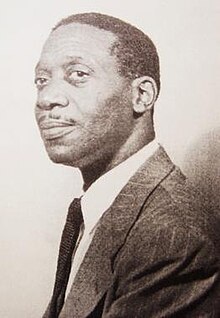This article includes a list of general references, but it lacks sufficient corresponding inline citations. (January 2013) |
Harry Haywood | |
|---|---|
 Haywood in 1948 | |
| Born | Haywood Hall February 4, 1898 South Omaha, Nebraska, U.S. |
| Died | January 4, 1985 (aged 86) |
| Resting place | Arlington, Virginia, U.S. |
| Occupation | Political figure |
| Spouse | Gwendolyn Midlo Hall |
| Children | 3 |
| Military career | |
| Allegiance | |
| Service | |
| Unit | 370th Infantry Regiment (United States) The "Abraham Lincoln" XV International Brigade |
| Battles / wars | World War I Spanish Civil War World War II |
Harry Haywood (February 4, 1898 – January 4, 1985) was an American political activist who was a leading figure in both the Communist Party of the United States (CPUSA) and the Communist Party of the Soviet Union (CPSU). His goal was to connect the political philosophy of the Communist Party with the issues of race.[1]
In 1926, he joined other African-American Communists and travelled to the Soviet Union to study the effect of Communism on racial issues found in the United States.[1] His work there resulted in his selection to be the head of the Communist Party's Negro Department.[1] The party platform changed by the late 1930s and began to stray away from advocating for African-American self-determination.[1] As the party's platform changed over time, Haywood lost his stance within the party.[1] His work also included creating a group to help the Scottsboro boys case.[1]
Haywood was also an author. His first book was Negro Liberation, published in 1948. After he was expelled from his affiliating party, he wrote an autobiography called Black Bolshevik, which was also published in 1978. He contributed major theory to Marxist thinking on the national question of African Americans in the United States. He was also a founder of the Maoist New Communist movement.